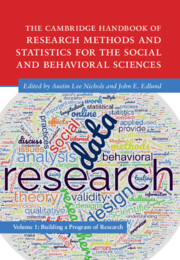 The Cambridge Handbook of Research Methods and Statistics for the Social and Behavioral Sciences
The Cambridge Handbook of Research Methods and Statistics for the Social and Behavioral Sciences from Part III - Data Collection
Published online by Cambridge University Press: 25 May 2023
This chapter provides an accessible introduction to experimental methods for social and behavioral scientists. We cover the process of experimentation from generating hypotheses through to statistical analyses. The chapter discusses classical issues (e.g., experimental design, selecting appropriate samples) but also more recent developments that have attracted the attention of experimental researchers. These issues include replication, preregistration, online samples, and power analyses. We also discuss the strengths and weaknesses of experimental methods. We conclude by noting that, for many research questions, experimental methods provide the strongest test of hypothesized causal relationships. Furthermore, well-designed experiments can elicit the same mental processes as in the real world; this typically makes them generalizable to new people and real-life situations.
To save this book to your Kindle, first ensure [email protected] is added to your Approved Personal Document E-mail List under your Personal Document Settings on the Manage Your Content and Devices page of your Amazon account. Then enter the ‘name’ part of your Kindle email address below. Find out more about saving to your Kindle.
Note you can select to save to either the @free.kindle.com or @kindle.com variations. ‘@free.kindle.com’ emails are free but can only be saved to your device when it is connected to wi-fi. ‘@kindle.com’ emails can be delivered even when you are not connected to wi-fi, but note that service fees apply.
Find out more about the Kindle Personal Document Service.
To save content items to your account, please confirm that you agree to abide by our usage policies. If this is the first time you use this feature, you will be asked to authorise Cambridge Core to connect with your account. Find out more about saving content to Dropbox.
To save content items to your account, please confirm that you agree to abide by our usage policies. If this is the first time you use this feature, you will be asked to authorise Cambridge Core to connect with your account. Find out more about saving content to Google Drive.